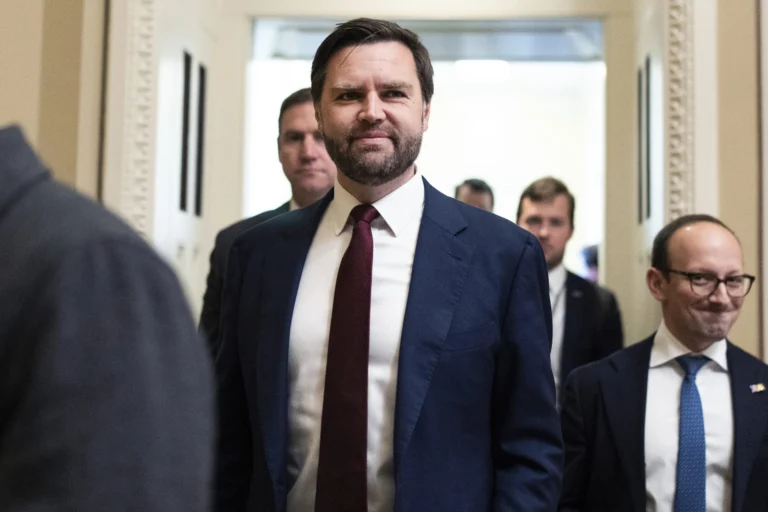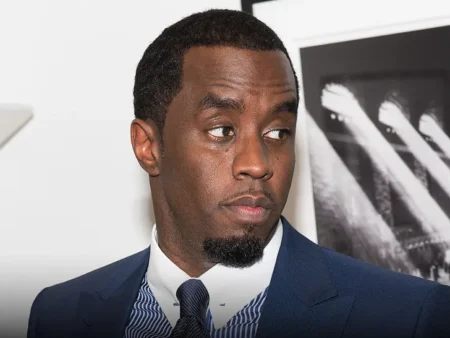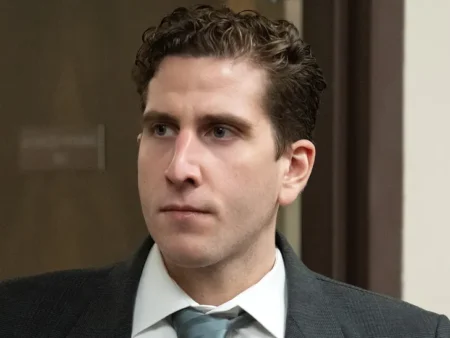In a time where political discourse often seems disconnected from everyday citizens, a recent back-and-forth between Vice President J.D. Vance and journalist Kyle Cheney on social media has raised eyebrows. The spirited exchange, which unfolded on X (formerly Twitter), has ignited a conversation about the role of social media in political debates and whether such public interactions between politicians and reporters are beneficial for the country.
Kyle Cheney, a reporter for Politico, appeared on “TMZ Live” on Tuesday to discuss his interaction with Vance, which centered around a controversial deportation case involving an immigrant who claims to have been accidentally sent to one of El Salvador’s most notorious prisons due to a clerical error. The exchange quickly became heated as the two men disagreed on various legal aspects of the case.
A Spirited Discussion
The disagreement was sparked when J.D. Vance took to social media to call out Cheney over the deportation case, accusing the Biden Administration of mishandling the situation. However, Cheney pointed out that Vance had some of the facts wrong, including a critical error in blaming the Biden Administration for an immigration judge’s ruling that had actually taken place during Trump’s first term.
Despite the tension, Cheney applauded Vance for eventually correcting his posts, including the misinformation about the immigration ruling. According to Cheney, this exchange exemplifies a new type of political discourse—one where leaders are more directly accountable to the public through social media platforms.
A New Age of Political Discourse
What makes this interaction particularly noteworthy is that it marks a rare instance of a high-profile politician like Vance engaging directly with a reporter in a public, digital forum. Unlike former VPs like Kamala Harris, Mike Pence, or Joe Biden, who have been relatively restrained in engaging with reporters online, Vance’s active participation in the social media conversation represents a shift in how political figures are interacting with the media and their constituents.
Kyle Cheney believes this kind of engagement is a positive development for democracy, as it opens the door to more transparency and allows for real-time correction of public statements. “It’s important for the public to see these exchanges happen,” Cheney said. “It forces politicians to be more accountable for what they say.”
However, Cheney made it clear that while he won the argument this time, he is open to future debates with Vance or any other political figure who is willing to engage in direct discussions. “If J.D. Vance wants to spar again, I’m happy to engage,” Cheney remarked during his appearance on “TMZ Live.”
Is This Good for Democracy?
For many, the question remains: is this type of public sparring on social media good for the country? On one hand, it can be seen as a form of open communication between public figures and the press, allowing the public to see a raw, unfiltered exchange of ideas. On the other hand, the nature of social media can sometimes lead to misunderstandings or the spread of misinformation, as seen in this particular case.
One of the potential risks of this form of discourse is that it can quickly devolve into arguments that are less about the facts and more about scoring points or attacking opponents. Politicians are often under immense pressure to respond quickly on social media, which can lead to hasty or inaccurate statements.
Yet, the more open and accessible this dialogue becomes, the more the public has the opportunity to see political leaders’ stances on critical issues in real-time. It could also push politicians to be more transparent and ensure that the information they share is accurate, knowing that their claims are subject to immediate scrutiny from both the media and the public.
A New Era of Political Accountability
The rise of social media as a platform for political debate signals the beginning of a new era in political accountability. As voters become more active online and demand greater engagement from their elected officials, social media exchanges between politicians and journalists could become more commonplace.
In the case of J.D. Vance and Kyle Cheney, the exchange demonstrated that social media can be an effective tool for holding politicians accountable, while also giving journalists a chance to correct inaccuracies in real-time. It also highlighted a growing trend in which politicians, particularly younger ones, engage with the public directly via platforms like Twitter and X.
This new style of political discourse is a departure from the traditional, often controlled press conferences and speeches. Social media provides a more immediate, unfiltered interaction, where politicians can engage with the public and journalists on their terms. Whether or not this trend becomes a permanent fixture in political culture will depend on how both politicians and the public embrace it in the coming years.
The Future of Social Media in Politics
As social media continues to shape political discourse, it’s clear that platforms like X (formerly Twitter) will play an increasingly pivotal role in how political figures interact with the public and the media. For reporters like Kyle Cheney, it offers a chance to directly challenge and fact-check politicians on their claims, ensuring that misinformation does not go unchecked.
For politicians, it presents an opportunity to engage with voters in a more direct and personal way. However, the line between genuine engagement and partisan sparring can sometimes blur, making it essential for both sides to prioritize facts over rhetoric.
As for Cheney, he remains open to more debates, noting that these public exchanges can only improve the quality of political discourse in America. “I’m happy to continue this conversation with anyone, as long as the focus remains on the facts and the truth.”
The Takeaway
While the back-and-forth between J.D. Vance and Kyle Cheney may seem like a mere social media dispute, it has sparked a larger conversation about the role of digital platforms in modern political communication. The ability for politicians and reporters to directly interact with one another on social media can lead to more transparency and accountability, but it also raises questions about the quality and tone of political discussions.
As this new era of political discourse continues to evolve, one thing is clear: the way political leaders communicate with the public is changing. Whether or not this will lead to more informed and engaged voters remains to be seen, but for now, the ongoing debate about social media’s impact on politics is a conversation worth having.








